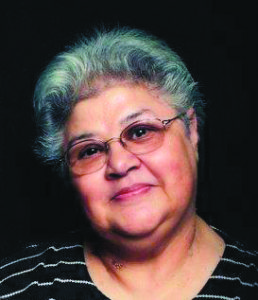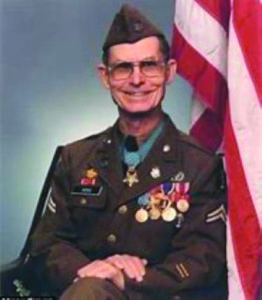

In May, 1945, as German troops were surrendering on the other side of the world, Japanese troops were fiercely defending the only remaining barrier (Okinawa and the Maeda Escarpment) to an allied invasion of their homeland. The men in the 77th Infantry Division were repeatedly trying to capture the Maeda Escarpment, an imposing rock face the soldiers called Hacksaw Ridge.
Less than one third of the men in the company made it back down. The rest lay wounded, scattered across enemy soil—abandoned and left for dead, if they weren’t already. One lone soldier disobeyed orders and charged back into the firefight to rescue as many of his men as he could, before he either collapsed or died trying. His iron determination and unflagging courage resulted in at least 75 lives saved that day, May 5, 1945.
“…I just kept prayin’, ‘Lord, please help me get more and more, one more, until there was none left….'”

Desmond Doss was born in Lynchburg, Virginia, to William T. Doss, a carpenter, and Bertha E. Doss, a homemaker and shoe factory worker. His mother raised him as a devout Seventh-day Adventist and instilled Sabbath-keeping, nonviolence, and a vegetarian lifestyle in his upbringing.
When it came to the Ten Commandments, he applied them personally. During childhood his father had purchased a large framed picture portraying the Ten Commandments with colorful illustrations. Next to the words, “Thou shalt not kill” was a drawing of Cain holding a club and standing over the body of his dead brother Abel.
Little Desmond would look at that picture and ask, “Why did Cain kill Abel? How in the world could a brother do such a thing?” In Desmond’s mind, God said, “If you love me, you won’t kill.” With that picture firmly embedded in his mind, he determined that he would never take life.
On April 1, 1942, Desmond Doss joined the United States Army. Little did he realize that three and a half years later, he would be standing on the White House lawn, receiving the nation’s highest award for his bravery and courage under fire.
When he joined the Army, Desmond assumed that his classification as a conscientious objector would not require him to carry a weapon. He wanted to be an Army combat medic. As luck would have it, he was assigned to an infantry rifle company. His refusal to carry a gun caused a lot of trouble among his fellow soldiers. They viewed him with distain and called him a misfit. One man in the barracks warned him, “Doss, as soon as we get into combat, I’ll make sure you won’t come back alive.”
Things began turning around when the men discovered that this quiet unassuming medic had a way to heal the blisters on their march-weary feet. And if someone fainted from heat stroke, this medic was at his side, offering his own canteen. Desmond never held a grudge. With kindness and gentle courtesy, he treated those who had mistreated him. He lived the golden rule, “…do to others what you would have them do to you…” (Matthew 7:12 NIV).
Desmond served in combat on the islands of Guam, Leyte, and Okinawa. In each military operation he exhibited extraordinary dedication to his fellow men. While others were taking life, he was busy saving life. When the cry, “medic” rang out on the battlefield, he never considered his own safety. He repeatedly ran into the heat of battle to treat a fallen comrade and carry him back to safety. All this, while enemy bullets whizzed past and mortar shells exploded around him. Several times, while treating a wounded soldier, Desmond was so close to enemy lines, he could hear the whispering of Japanese voices.

On Saturday May 5, 1945 (the Sabbath), the tide of battle turned against the Americans. Enemy artillery, mortars and machine-gun fire began to rake into the ranks of Company B, 77th Infantry Division. Japanese soldiers swarmed out of their foxholes and caves in every direction. Almost immediately 75 men fell wounded, and the remaining men were forced to fall back and retreat to the base of the escarpment. The only soldiers remaining at the top of the cliff were the wounded, the Japanese, and Desmond T. Doss.
Heedless of the shells that burst around him and the bullets directed his way, Doss tended his injured comrades. At the base of the escarpment, those few soldiers who had managed to escape the onslaught could only sit helplessly by and hear the sounds of the battle as the wounded struggled to survive atop the cliff. And then…amazingly…a wounded soldier appeared over the face of the escarpment.
Dangling from a rope, the wounded soldier was slowly lowered to the safety of its base as a tall medic fed the rope through his hands from the summit. First one, then another, and another…and another. Heedless of the advancing Japanese, Desmond Doss went about the work of sending the wounded to safety. Reports of that day tell of Japanese advancing with rifles and bayonets to within a few feet of the medic, slowly lowering his men to safety, before one of the wounded could kill the enemy before they shot Doss.
For five hours Doss lowered soldier after soldier down the face of the escarpment, using little more than a tree stump to wind the top edge of the rope around. All the while, Doss had only one thought. He prayed, “Lord, help me get one more. Just one more!” How many men Doss saved that day, only God knows. One hundred and fifty-five soldiers went up the escarpment that day, and only 55 were able to retreat without assistance. The Army determined the conscientious objector, who had almost been court martialed or discharged as unfit for military service, had saved 100 lives. “Couldn’t be,” Doss had replied. It couldn’t have been more than 50. I wouldn’t have had the time to save 100 men.” In deference to Doss’ humble estimate, when the citation for his Medal of Honor was written, they “split the difference,” crediting the intrepid soldier with saving 75 fellow soldiers.
Eventually, the Americans took Hacksaw Ridge. Okinawa was captured inch by bloody inch. Several days later, during an unsuccessful night raid, Desmond was severely wounded. Hiding in a shell hole with two riflemen, a Japanese grenade landed at his feet. The explosion sent him flying. The shrapnel tore into his leg and up to his hip. He treated his own wounds as best he could. While attempting to reach safety, he was hit by a sniper’s bullet that shattered his arm. His brave actions as a combat medic were done. But not before insisting that his litter-bearers take another man first before rescuing him.
Wounded, in pain, and losing blood, he still put others ahead of his own safety. He would choose to die so another could live. After all, that’s what he read in his Bible. Such was the character demonstrated by Jesus Christ.
No Comments
Leave a comment Cancel